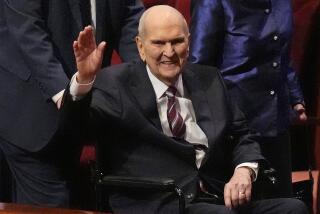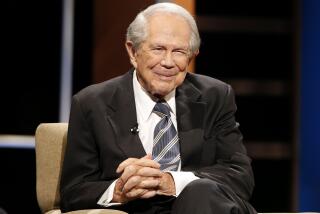Ezra T. Benson, Leader of Mormons, Dies : Religion: The church’s president-prophet was 94. He also had served in Eisenhower’s Cabinet as secretary of agriculture and was once known for his conservative politics.
Ezra Taft Benson, the U.S. secretary of agriculture under President Dwight D. Eisenhower who put aside his advocacy of ultraconservative politics late in life when he became the president-prophet of the Mormon Church, died Monday.
He was 94 and died at his Salt Lake City home. He had been in failing health for some time, had undergone surgery four years ago to relieve a fluid buildup on his brain, and died of congestive heart failure.
Unable to speak, Benson spent his last years under the 24-hour care of a nurse in his apartment across the street from church headquarters.
In contrast to his once outspoken support of the controversial John Birch Society and his ardent anti-communism, Benson’s messages to the nearly 9 million members of the church during his tenure as church president were spiritual ones.
Benson typically endorsed traditional morality and faith in the Book of Mormon, the church’s principal scriptures, and reasserted long-held Mormon beliefs about the sacred nature of the U.S. Constitution.
He was 86 when he was named 13th president of the Mormon Church, formally known as the Church of Jesus Christ of Latter-day Saints, on Nov. 10, 1985. As such, he was the second oldest man ever to be installed in the powerful position, one in which Mormons believe the holder receives revelations from God.
He succeeded Spencer W. Kimball, who died at age 90. Presidents of the Mormon church serve for life.
Benson’s tenure was not marked by major pronouncements or new directions. He kept a low public profile by declining all interview and news conference requests, maintaining that church business took first place.
Next in seniority on the Council of 12 Apostles and Benson’s likely successor is onetime Los Angeles lawyer Howard W. Hunter, who would be the first Mormon president born in the 20th Century. He is 86.
When Benson’s predecessor, Kimball, was installed as Mormon president in late 1973, it was widely thought that it would not be long before the second in line, the politically vocal Benson, would accede to the high church office. The ailing Kimball had undergone heart surgery only a year earlier.
Some church members, especially a liberal minority, openly speculated on whether Benson, if he survived Kimball, would use the church presidency for right-wing political ends.
Benson encouraged that speculation early in 1974, saying that it was “entirely possible” that the president of the Mormon Church might someday endorse political candidates, despite the church’s carefully nurtured political neutrality in this century.
He had lauded the principles of the American Party, the successor to the American Independent Party, which had nominated Alabama Gov. George Wallace for President in 1968.
Many at that time felt he would be Wallace’s running mate, but Wallace instead chose retired Gen. Curtis Le May.
In 1979, speaking to the fall church conference, Benson lamented that America was never so vulnerable to communism as it was then because the government, in his words, had allowed Cuba to become a Soviet military base and had permitted the Marxist takeover in Nicaragua, “the surrender of the Panama Canal (and) the infiltration by enemy agents within our American borders.”
But by the time Kimball died in 1985, Benson was rarely heard on political subjects. Church officials said upon Kimball’s death that Benson had moderated his political views and that politics was “not really his agenda anymore.”
The Mormon Church experienced steady growth during Benson’s presidency. Founded in 1830 by Joseph Smith in Upstate New York, the church underwent vilification and persecution wherever it tried to establish itself in the Midwest, mainly because of polygamy, a practice rescinded in 1890.
By World War II, Mormons were beginning to gain grudging respect from Americans for their clean living, hard work and the popular Mormon Tabernacle Choir.
Like many Mormons of the first half of the 20th Century, Benson had his roots in the Far West.
Born Aug. 4, 1899, in Whitney, Ida., he was descended from Mormon pioneers who accompanied Brigham Young on the westward trek to Utah in 1847.
The oldest of 11 children, Benson left the family farm in 1919 to study agriculture in college, interrupted his studies for two years of missionary service in England, then graduated from the church-run Brigham Young University in 1926. That same year he married Flora Amussen--who died in 1992--and left for Iowa State University, where he earned a master’s degree in 1927.
Benson returned to Idaho where, besides becoming a church leader in Boise, he was a county agricultural agent and secretary of the Idaho Cooperative Council from 1933 to 1939. In 1939 he moved to Washington to become executive secretary of the National Council of Farmers Cooperatives.
Called by the church in 1943 to join the high-ranking Council of the 12 Apostles, Benson and his family returned to Utah. He was installed on the council on the same day as Spencer Kimball, but a few minutes after Kimball--a difference which placed Benson after Kimball in seniority on the council, and thus behind him for the church presidency.
He performed high-level volunteer work with the Boy Scouts and went on a post-war mission to Europe to aid the recovery of Mormon churches there. From 1946 to 1950 he served as director of the Farm Foundation, receiving national exposure with zealous attacks on “paternalistic government” and his calls for farm groups to endorse the free enterprise system.
In 1952, President-elect Eisenhower named him to head the Department of Agriculture, an appointment interpreted at the time as a concession to the conservative wing of the Republican Party.
Farm problems mounted in the 1950s. Despite a steady decline in farm population, improved technology at ever-larger farms produced crops in excess of the market demand. Previous administrations had bought the farmers’ surplus and sought to bolster farm income with subsidies, or price supports.
Benson, who served during both of Eisenhower’s terms, believed that the best long-term solution was for the farm economy to return to the free market of supply and demand. But a variety of proposed approaches, including flexible price supports, met repeated opposition from Congress and many farmers.
South Dakota farmers once pelted Benson with eggs when he spoke in favor of flexibility in farm programs. In his book “Farmers at the Crossroads,” Benson wrote that 21 Midwestern congressmen stormed into his office demanding rigid price supports for hogs. He refused, and wrote that the price of hogs soon rose on its own.
Benson’s name had surfaced in conservative circles as a possible candidate as early as the 1964 and 1968 presidential elections but his fervent anti-communist rhetoric and close identification with the John Birch Society was thought to limit his appeal to Republicans in general. The mini-movements also became of some concern to Mormon leaders who wished the public to see the church as loyally American but politically neutral.
In 1963, David O. McKay, then church president, issued a statement criticizing the John Birch Society for questioning the loyalty of elected officials and for seeking “to align the church or its leadership with (the society’s) partisan views.”
Yet, that same year, Benson extolled Birch Society founder Robert Welch “as one of the great patriots in American history” at a testimonial dinner for Welch at the Hollywood Palladium.
The church then asked Benson to spend the next two years directing the Mormon mission in Europe--not an unusual assignment for a church leader, but one widely interpreted at the time as a way to remove him from political controversy.
But when it was announced that he had been chosen to lead the church, Benson said only that he intended to continue the church’s missions “to preach the Gospel, perfect the saints (faithful Mormons) and redeem the dead (a temple ceremony in which deceased ancestors are offered baptism by proxy into the church). We shall continue every effort to carry out this mission,” he added.
Benson authored nine books and numerous pamphlets, “all dealing with the topic of freedom as man’s God-given heritage.” He also was awarded four George Washington Honor medals by the Freedoms Foundation at Valley Forge, Pa.
Benson and his wife had six children, all of whom survive, as do 34 grandchildren and 55 great-grandchildren.
More to Read
Sign up for Essential California
The most important California stories and recommendations in your inbox every morning.
You may occasionally receive promotional content from the Los Angeles Times.










